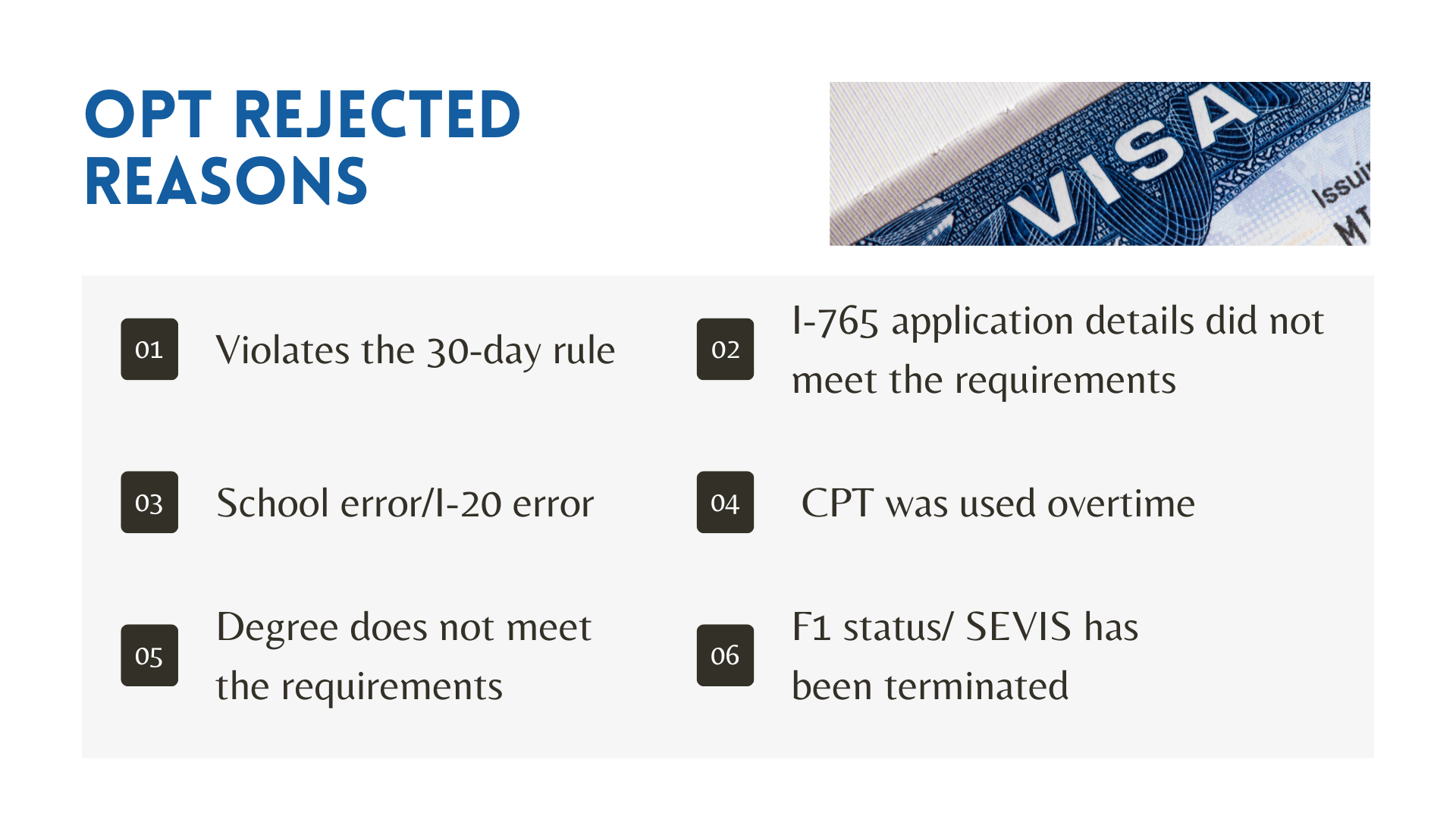

OPT (Optional Practical Training) is employment training directly related to an F-1 student’s major area of study. Eligible students can apply for up to 12 months of employment authorization in below formats:
However, all periods of Pre-completion OPT will be deducted from the available period of Post-completion OPT.
OPT Is a work permit granted by the U.S. government to international students to stay in the United States after graduation. It’s a 1-year work authorization, but STEM majors could get up to 3 years of OPT with STEM OPT extension.
.png)
What does OPT Rejection mean for international students?
It means that the student will lose their legal work status in the United States. If they fail to depart the US within the given time limit, they will become an illegal resident. This would render years of complex study and hard work in vain.
Many recently graduated students have received OPT EAD cards. However, we have also received numerous inquiries from students seeking help after their OPT applications got rejected.
Students who face OPT rejection are understandably concerned and may have questions, for instance:
Hopefully some of your questions can be answered after going through this page.

1. Late OPT application submission results in rejection
USCIS enforces the "30-day rule" for OPT applications, requiring applicants to submit their OPT applications within 30 days of the OPT start date recommended by the DSO. Failure to meet this deadline will lead to USCIS rejecting the application. Many students make the mistake of not submitting their application on time and get rejected.
2. Inadequate I-765 materials lead to OPT rejection
Rejected OPT applications often result from incomplete or inaccurate application materials. This frequently occurs because students are unaware of the detailed application requirements. Common mistakes include submitting the incorrect check format, missing information on the I-765 form, forgetting to sign, providing incorrect information, and using the wrong OPT code.
3. School or I-20 errors can cause OPT rejection
When applying for OPT, students must first obtain an OPT recommendation I-20 from the DSO responsible for international student affairs and update their I-20 status in the system. During peak OPT filing periods, it is possible for the DSO to issue the wrong I-20 or forget to update the I-20 status, resulting in submitting the wrong OPT I-20 to USCIS, leading to its rejection. Students must review the documents thoroughly to avoid errors.
4. Full-time CPT for 12 months can lead to OPT rejection
Using full-time CPT for one year cancels out OPT eligibility for this particular degree level. Students must ensure that they use CPT for no more than 11 months or part-time CPT to avoid being rejected for OPT after graduation.
5. Applying with an ineligible degree results in OPT rejection
International students may only apply for OPT once for each degree they obtain. They cannot apply for the same education level multiple times. For instance, if they have already used their master's OPT, then their future degree at the same level will not qualify for OPT application.
6. F1 status or SEVIS termination can cause OPT rejection
For students who change their SEVIS number, the new SEVIS will reset the calculation of their time under F1 student status in the United States. USCIS requires students who have less than one academic year (or two semesters) of student status to be ineligible for OPT. Changing SEVIS numbers or changing their i20 or school within one year of graduation increases the probability of OPT rejection. In such cases, students should defer their graduation or prepare to not have OPT.
*If a student's OPT application is denied, they will receive an OPT Denial Notice from USCIS within 2 weeks, explaining the reason for the denial. OPT denials often lead to I-20 and F1 status lapses, which can affect F1's legal status in the United States. Regardless of the reason for the rejection, students must take immediate action to minimize the impact on their legal status in the US.